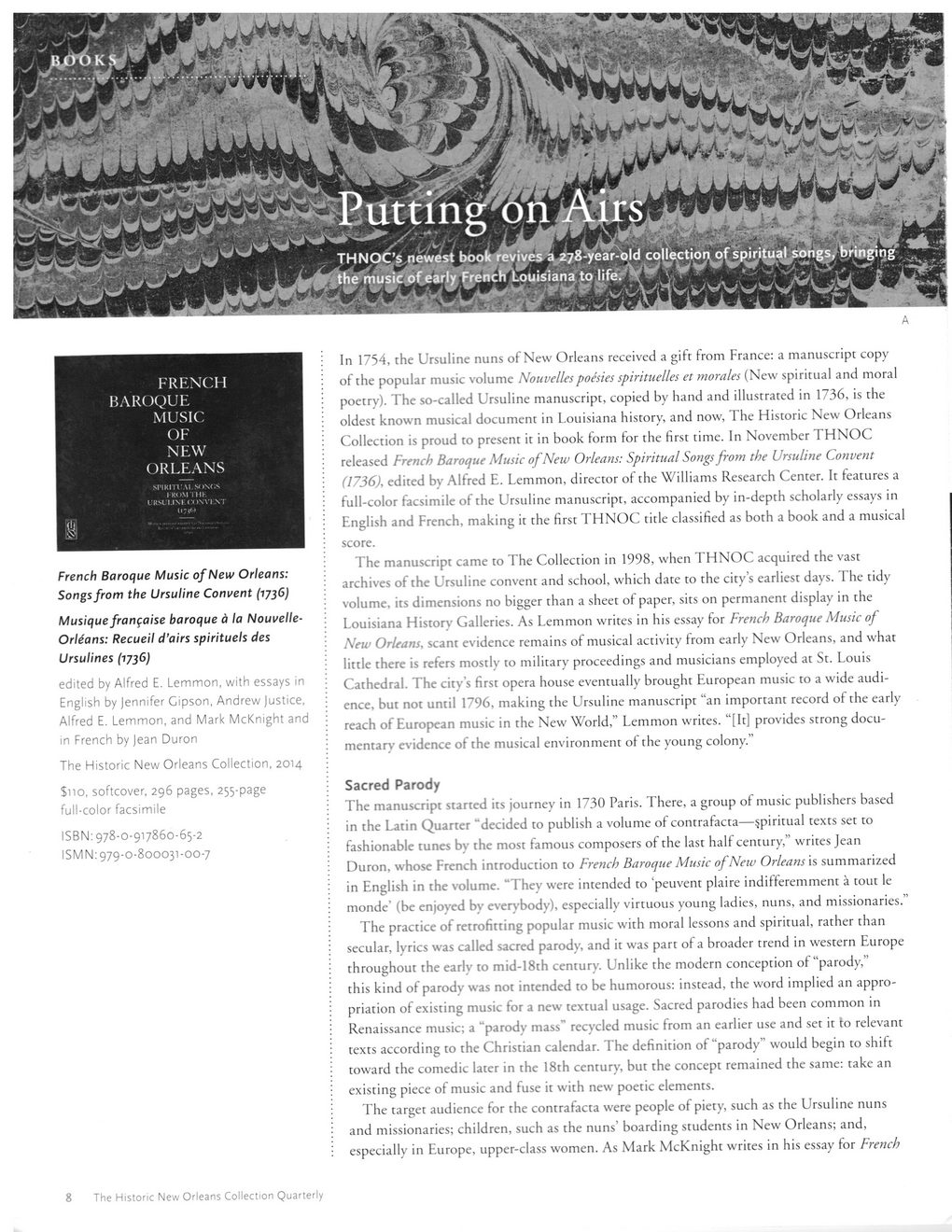This text was obtained via automated optical character recognition.
It has not been edited and may therefore contain several errors.
A FRENCH BAROQUE MUSIC OF NEW ORLEANS Sl’IKnV.U.SOSCiS I-ROM I MK L'KSL'I.IN'KC* IWI NT I French Baroque Music of New Orleans: Songs from the Ursuline Convent (1736) Musique frangaise baroque a la Nouvelle-Orleans: Recueil d’airs spirituels des Ursulines (1736) edited by Alfred E. Lemmon, with essays in English by Jennifer Gipson, Andrew Justice, Alfred E. Lemmon, and Mark McKnight and in French by Jean Duron The Historic New Orleans Collection, 2014 $110, softcover, 296 pages, 255-page full-color facsimile ISBN: 978-0-917860-65-2 ISM N: 979-0-800031-00-7 In 1754, the Ursuline nuns of New Orleans received a gift from France: a manuscript copy of the popular music volume Nouvellespoesies spirituelles et morales (New spiritual and moral poetry). The so-called Ursuline manuscript, copied by hand and illustrated in 1736, is the oldest known musical document in Louisiana history, and now, The Historic New Orleans Collection is proud to present it in book form for the first time. In November THNOC released French Baroque Music of New Orleans: Spiritual Songs from the Ursuline Convent (1736), edited by Alfred E. Lemmon, director of the Williams Research Center. It features a full-color facsimile of the Ursuline manuscript, accompanied by in-depth scholarly essays in English and French, making it the first THNOC title classified as both a book and a musical score. The manuscript came to The Collection in 1998, when THNOC acquired the vast archives of the Ursuline convent and school, which date to the city’s earliest days. The tidy volume, its dimensions no bigger than a sheet of paper, sits on permanent display in the Louisiana History Galleries. As Lemmon writes in his essay for French Baroque Music of New Orleans, scant evidence remains of musical activity from early New Orleans, and what little there is refers mostly to military proceedings and musicians employed at St. Louis Cathedral. The city’s first opera house eventually brought European music to a wide audience, but not until 1796, making the Ursuline manuscript “an important record of the early reach of European music in the New World,” Lemmon writes. “[It] provides strong documentary evidence of the musical environment of the young colony.” Sacred Parody The manuscript started its journey in 1730 Paris. There, a group of music publishers based in the Latin Quarter “decided to publish a volume of contrafacta—spiritual texts set to fashionable tunes by the most famous composers of the last half century,” writes Jean Duron, whose French introduction to French Baroque Music of New Orleans is summarized in English in the volume. “They were intended to ‘peuvent plaire indifferemment a tout le monde’ (be enjoyed by everybody), especially virtuous young ladies, nuns, and missionaries.” The practice of retrofitting popular music with moral lessons and spiritual, rather than secular, lyrics was called sacred parody, and it was part of a broader trend in western Europe throughout the early to mid-18th century. Unlike the modern conception of “parody,” this kind of parody was not intended to be humorous: instead, the word implied an appropriation of existing music for a new textual usage. Sacred parodies had been common in Renaissance music; a “parody mass” recycled music from an earlier use and set it to relevant texts according to the Christian calendar. The definition of “parody” would begin to shift toward the comedic later in the 18th century, but the concept remained the same: take an existing piece of music and fuse it with new poetic elements. The target audience for the contrafacta were people of piety, such as the Ursuline nuns and missionaries; children, such as the nuns’ boarding students in New Orleans; and, especially in Europe, upper-class women. As Mark McKnight writes in his essay for French 8 The Historic New Orleans Collection Quarterly

New Orleans Quarterly 2015 Winter (10)